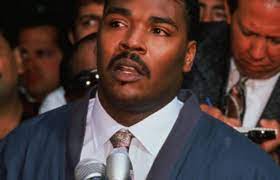
It goes back 30 years, but I remember this solemn-faced man stepping toward a news camera in May 1992. He was neatly dressed in a jacket and tie. But he looked drawn, upset and extremely nervous. The man chose his words carefully. He looked into the lens and in the most genuine of expressions offered a simple statement and an even simpler question:
“It’s not right. And it’s not going to change anything. Can we all just get along?” he asked.
The man was Rodney King, the African-American construction worker who’d been beaten by four Los Angeles police officers in what they called an arrest for a suspected drunk driving offence in March 1991. Video showed the police beating King with batons for 15 minutes, after he’d been tasered and was lying on the ground. The four officers were eventually tried on brutality charges, but were acquitted. Within hours of the verdict, outrage turned to violence, and L.A. erupted in anger and flames. The riots continued for five days; 63 people died, 2,300 were injured, 12,000 arrested. It took 3,500 soldiers to restore order in the city.
That’s when King pleaded on camera, “Can we all just get along?”
King’s words came to me as I watched our federal election campaign returns on Monday night. In particular, I was remembering the incident two weeks ago when protesters threw rocks at Justin Trudeau during a campaign stop in London, Ont.

But the leaders weren’t the only victims of vitriol and violence. Somebody spray-painted swastikas on the campaign signs of both Conservative and Liberal candidates in Ottawa last month. And Marci Ien running for the Liberals and Annamie Paul for the Greens (both African-Canadian women running in Toronto Centre) endured anti-black racist taunts during the campaign.
“I got death threats. My family was threatened,” Ien told the Star.
It’s very easy to blame the former president of the United States and his overt Islamophobia, his anti-black racism, his “drug dealers, criminals and rapists” epithets about Mexicans, and the rest of his impeachable rhetoric for giving right-wing extremists licence to do likewise in Canada.
Many of us in Canada (myself included) are quick to suggest such anger, such hatred, such protest “are not who we are.” But it would also be a mistake to simply dismiss such behaviour the way Hillary Clinton did during the 2016 U.S. presidential election campaign.
“You can take Trump supporters and put them in … big baskets,” Clinton said during an TV interview on Sept. 8. “They are what I would call the deplorables…”
During our federal election, one Canadian commentator suggested that the Liberals, New Democrats and Greens not consider a “basket of deplorables 2.0 strategy” in refuting the Conservatives or Maxine Bernier’s People’s Party of Canada because it could backfire.
As the “basket” analogy has in the U.S. the past two elections, such pigeon-holing of the right tends to embolden some to come out of the shadows (or anonymity) and onto social media to spout their anti-lockdown, anti-vaccination, anti-science, anti-regulation conspiracy mythology in the open. If you doubt it’s here, just read some of Bernier’s Twitter feeds about the People’s Party of Canada.
“The phenomenal rise of PPC is the big surprise of this campaign,” wrote PPC leader Bernier on Monday. “But see these tweets from the lying mainstream media this morning. They’re still pretending we don’t exist.”
Bernier calls his supporters “the purple army.” And, to be fair, the Sept. 20 election results prove him right. The PPC grew its support from less than two per cent across the country to more than six per cent.
“More than one million Canadians were part of the purple wave,” he said, “that rejected COVID hysteria and government overreach.” He did not win his seat in Beauce, Que., but during the election, he went so far as to call Trudeau a “fascist psychopath.”
All of which brings me back to Rodney King, a black American in the middle of a race riot in 1991 calling for calm in the face of anarchy. Canadians have just shown their Parliamentarians that they do not care to give majority power to any of the national political leaders.
Canadians have told candidates they don’t want another election for a long time. They want vital issues such as jobs, the economy, child care, women in the economy, affordable housing, homelessness, climate change, reconciliation with Indigenous people all addressed now!
And not necessarily along party lines. They want the pandemic crushed scientifically and forthrightly. And for the most part, Canadians want Parliamentarians to do it together!
I believe Monday’s vote was a call for politicians and the electorate to just get along to get things done. And a minority Parliament is perhaps the most likely means to do it.